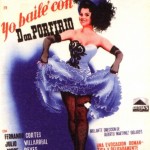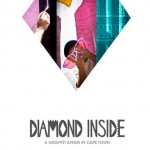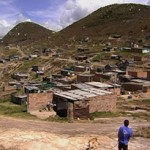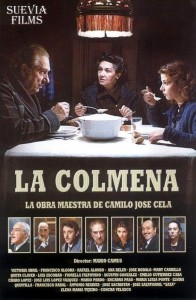Blog del Instituto Cervantes de Dublín
Torre Martello
Cine / Film screening: Yo bailé con Don Porfirio
 Finalizamos hoy el ciclo “Grandes figuras del cine mexicano” con la proyección de “Yo bailé con Don Porfirio” en el Café Literario a las seis.
Finalizamos hoy el ciclo “Grandes figuras del cine mexicano” con la proyección de “Yo bailé con Don Porfirio” en el Café Literario a las seis.
México a principios de siglo. Don Severo, su esposa y su hija Rosa llegan a la capital donde él tiene otra hija, Violeta, quien aspira a ser vedette. Ambas son idénticas y ese parecido provocará varios equívocos. Don Severo se encuentra con Porfirio, su amigo astrólogo, quien le presenta al coronel don Evaristo, el cual va a dar una fiesta para don Porfirio. El teatro Principal, la sociedad afrancesada y los duelos dan vida a esta comedia nostálgica.
Film screening | Cine: Día noche + En la línea
Cine documental hoy a las seis en el Café Literario. Os ofrecemos un programa doble con las proyecciones de Día noche y En la línea dentro del ciclo de cine Los límites de la frontera en cooperación con PhotoIreland.
Dia noche ocurre un sábado cualquiera en el sur de California. Adam, un norteamericano de clase media-baja, se despide de su mujer e hijos para acometer su tarea semanal. Un cometido que entraña sacrificios pero que él desempeña con la sólida convicción de sus ideales.
En la línea oscila entre el vértigo que moldea el día y la noche en la capital china seguimos durante un año a un motero danés que sueña con abrir un bar rockabilly a orillas del lago Houhai, a una estudiante del norte del país que deambula entre dos modelos culturales, a un joven de Alaska que se esconde bajo la tierra de Pekín y a un periodista español empeñado en dar con la tecla que desenvuelva el misterio que le rodea. Su cotidianidad nos descubrirá una China corriente y cercana a trasmano del tópico.
Documentary cinema today at 6pm at Café Literario. There will be two films today: Day Night and On the line. They are part of The Limits of the Frontiers series in cooperation with PhotoIreland.
Day Night happens during an ordinary Saturday in Southern California. Adam, an American lower-middle class man, bids farewell to his wife and children to undertake his weekly chore. A task implying sacrifices, but that he accomplishes with the solid conviction of his ideals.
On the line tells the vertigo that shapes day and night in China’s capital, this documentary follows, over a year, the lives of a Danish biker who dreams of opening a rockabilly bar by Houhai Lake, a student from the North wandering between two cultural models, ayoung man from Alaska who hides underground inBeijing, and a Spanish journalist seeking to unravel the mystery that surrounds him. Their everyday lives reveal a China that, contrary to thecliché, is ordinary and close.
Film screening | Cine: Diamond Inside
 Diamond Inside narra el viaje a CapeTown del colectivo Boa Mistura donde entrarán en contacto con artistas y vecinos de los barrios marginales de la ciudad, como Khayelitsa o Woodstock, con el objetivo de pintar murales que inspiren un cambio en la comunidada través del arte. El documental recala las experiencias personales de varios habitantes que luchan para generar ese cambio entre la población más desfavorecida. Esta es la tercera sesión del ciclo Los límites de la frontera, en cooperación con PhotoIreland. La proyección es hoy a las seis en el Café Literario.
Diamond Inside narra el viaje a CapeTown del colectivo Boa Mistura donde entrarán en contacto con artistas y vecinos de los barrios marginales de la ciudad, como Khayelitsa o Woodstock, con el objetivo de pintar murales que inspiren un cambio en la comunidada través del arte. El documental recala las experiencias personales de varios habitantes que luchan para generar ese cambio entre la población más desfavorecida. Esta es la tercera sesión del ciclo Los límites de la frontera, en cooperación con PhotoIreland. La proyección es hoy a las seis en el Café Literario.
Diamond Inside is the journey of the B oa Mistura collective to Cape Town. On their arrival they will meet artists and people from marginalised neighbourhoods in the city, such as Khayelitsa or Woodstok. Their goal is to draw murals that inspire change through art in the comunity. This documentary recounts personal experiences of various dwellers who struggle to generate that change amongst the most underpriviledged sector of the population. This is the third session of The Limits of Frontierscinema series that has been organized in cooperation with PhotoIreland. The screening is today at 6pm at Café Literario.
oa Mistura collective to Cape Town. On their arrival they will meet artists and people from marginalised neighbourhoods in the city, such as Khayelitsa or Woodstok. Their goal is to draw murals that inspire change through art in the comunity. This documentary recounts personal experiences of various dwellers who struggle to generate that change amongst the most underpriviledged sector of the population. This is the third session of The Limits of Frontierscinema series that has been organized in cooperation with PhotoIreland. The screening is today at 6pm at Café Literario.
Film screening | Cine: En enero quizás + Distancias
Esta tarde comienza el ciclo de cine Los límites de la frontera, organizado con PhotoIreland . Para la primera sesión os hemos preparado un programa doble.
os hemos preparado un programa doble.
Primero se proyectará Distancias.
La historia: Un grupo de refugiados del Congo está bloqueado en Rabat. La frontera con España les impide cruzar a Europa. En una remota habitación en la periferia de la ciudad ensayan una pieza de teatro sobre su propia experiencia. Una obra imperfecta, inacabada. La vida real se confunde con su representación.
Entre ellos, Apollinaire cuenta, frontalmente, un eterno viaje de final incierto. Archivos televisivos muestran migrantes expulsados al desierto, obligados a empezar de nuevo. Rostros que han perdido sus nombres. Y detrás permanecen los espacios vacíos de lo sucedido. Huellas silenciosas que revelan su historia como nuestra.
Y seguidamente os ofrecemos En enero quizás.
La historia: Rumania ha entrado en la Unión Europea el 1 de enero de 2007. En la misma fecha se estableció una moratoria de dos años a la libre circulación de trabajadores procedentes de Rumania. En consecuencia de esta medida, hasta el 1 de enero de 2009, muchos rumanos que se encuentran en España no pueden trabajar por cuenta ajena pero tienen el derecho de residencia… Daniel es un rumano que intenta sobrevivir en las calles de Barcelona y aunque sin abrigo mantiene la esperanza que en enero de 2009 conseguirá encontrar un trabajo y reorganizar su vida.
Os esperamos hoy a las 18:00 en el Café Literario.
This evening the new cinema series The limits of the frontiers starts. It is organized in cooperation with PhotoIreland. A group of refugees from Congo are stuck in Rabat. The Spanish borderline prevents them from entering Europe. In a remote room on the outskirts of the city they rehearse a theatre piece based on their own experiences. An imperfect, unfinished piece. Boundaries between real life and the stage are blurred.
First we will show Distancias.
The story: Apollinaire recounts, face to face, the never-ending journey with an uncertain conclusion. Television archive images show us emigrants forced into the desert to start their journey once more. Faces without a name. Left behind are the empty spaces of what has already happened. Silent tracks that reveal their story as our own.
The second screening is En enero quizás.
The story: When Romania joined the European Union on the 1st of January 2007, the Spanish government established a two-year moratorium to restrict freedom of movement for Romanian workers. Following this measure, many Romanians with residency status in Spain were prevented from working in Spain until the 1st of January 2009. Daniel is a homeless Romanian that struggles to survive in the streets of Barcelona and believes that he will find a job in January 2009 and change his life.
We hope to see you today at 6pm at Café Literario.
Cine y coloquio / Film screening and Q&A with directors David Trueba and Luis Alegre : La silla de Fernando
Hoy miércoles, a las seis de la tarde, proyectamos en el Café Literario el documental La silla de Fernando. Fernando Fernán-Gómez tenía personalidad fuera de serie que aportó gran riqueza con su actividad intelectual. Actor, escritor y director de cine, teatro y televisión, Fernán-Gómez es un gigante del siglo XX español y, en general, un hombre esencial de la historia de nuestra cultura.
Cualquiera puede apreciar sus decisivas aportaciones como actor, escritor y director de cine. Sin embargo, sólo unos pocos privilegiados conocen hasta qué punto Fernando, sentado en una silla, es capaz de convertir una charla en algo más que una charla. Esta película aspira a que esos privilegiados no sean tan pocos.
Tras la proyección, los directores de la película, David Trueba y Luis Alegre, mantendrán un coloquio y responderán a las preguntas del público.
David Trueba and Luis Alegre uncover Fernando Fernán-Gómez, an outstanding character who enriched Spanish culture with his work: actor, writer and television, theatre and cinema director. Fernán-Gómez is a giant of the Spanish 20th Century and an essential figure in Spain’s cultural heritage. The film screening and the Q&A will take place today at 6pm at Café Literario.
The story: La silla de Fernando is a documentary-conversation with Spanish actor Fernando Fernán-Gómez. The actor/director talks about his life: the civil war, his youth, Madrid nights, women and love and Franquism amongst other topics. His contribution as an actor, writer and cinema director is second to none. But only a few are lucky enough to discover the extent to which Fernando, sitting on a chair, is capable of turning a chat into something more meaningful. This film aspires to make these lucky few somewhat greater in number. After the screening there will be Q&A with directors David Trueba and Luis Alegre
Cine / Film screening: La Colmena
 La segunda sesión del ciclo “Un libro, una película” tendrá lugar esta tarde a las seis en el Café Literario. Se proyectará la película “La colmena”, la adaptación de uno de los clásicos recientes de la literatura española. Está basada en la novela homónima del Premio Nobel de Literatura (1989) Camilo José Cela (1916-2002).
La segunda sesión del ciclo “Un libro, una película” tendrá lugar esta tarde a las seis en el Café Literario. Se proyectará la película “La colmena”, la adaptación de uno de los clásicos recientes de la literatura española. Está basada en la novela homónima del Premio Nobel de Literatura (1989) Camilo José Cela (1916-2002).
Autor muy prolífico, trabajó como novelista, periodista, ensayista, editor y conferenciante. Fue académico de la Real Academia Española y recibió numerosos reconocimientos como el Premio Nobel de Literatura en 1989 o el Premio Cervantes en 1995. Fue autor de más de 60 obras y de novelas memorables que también han sido llevadas al cine, destacando La familia de Pascual Duarte y La colmena.
“La colmena” es una historia coral que se inicia, y continúa a veces, en el café La Delicia. El café está siempre repleto de personas que huyen del frío, que se refugian en la charla, en la compañía, y en los sueños… Son sesenta personajes, dentro y fuera del café, que vemos vivir en las calles y en las casas de la ciudad. Son un torrente de gentes que a veces son felices, y a veces, no. Tras ellos, como fondo, el paisaje urbano del Madrid de la posguerra, tan especial, tan distinto, tan sórdido, tan luminoso a veces. El tema principal de la película es el contraste entre los poetas que sobreviven a la miseria bajo el régimen franquista y los ganadores de la guerra, una clase emergente que hace dinero fácil a través de negocios ilegales.
Dirige la película Mario Camus (Santander, 1935). Estudió cine en la Escuela Oficial después de pasar por la facultad de derecho. Destaca por su maestría en la dirección de adaptaciones cinematográficas al cine.
A la proyección le seguirá un debate dirigido a todo tipo de público a cargo del profesor Juan Pablo Auñón.
The second session of the cinemas series “One book, one film” will take place today at 6pm in the Café Literario. It will be screened the film “La colmena”, the adaptation of one of the recent classics of the Spanish Literature. It is based on a 1943 book of the same title by the Nobel Price in Literature (1989) Camilo José Cela (1916-2002).
He was a prolific novelist, journalist, essayist, editor and lecturer. He was appointed member of the Royal Spanish Academy (Real Academia Española). Amongst some of the numerous awards he received are the 1989 Nobel Prize in Literature or the Cervantes Prize in 1995. He published over 60 works and memorable novels that were adapted to the cinema like La familia de Pascual Duarte y La colmena.
“La Colmena” is an ensemble film that features the comings and goings of a wide variety of characters, all trying to survive in a poverty-stricken Madrid during World War II. Rather than feature any single story line, these people from all walks of life cross paths almost randomly as they come to a café to sip their one cup of coffee and work on a book, or pick up a prostitute, or get their shoes shined, or play billiards, or just warm themselves on a cold winter’s day. The main theme of the film is the contrast between the poets, surviving close to misery under the Franco’s regime, and the winners of the war, the emerging class of the people that makes easy money with illegal business.
Mario Camus (Santander, 1935) studied law followed by cinema studies at the Spanish Official Cinema
School. He belongs to the so called “New cinema generation” together with Saura and Martín Patino amongst others. He excels in his work as director of screen adaptations.
The screening will be followed by an open discussion moderated by the teacher Juan Pablo Auñón.
Celda 211: un peliculón / a not to be missed!
Además de arrasar en los Premios Goya con 8 estatuillas, Celda 211 ha tenido una excelente acogida por parte del público, dos hechos que la convierten, como decimos coloquialmente en español, en todo un peliculón. Por supuesto, no podía quedar fuera del ciclo de Premios Goya que el Instituto Cervantes de Dublín ofrece al público irlandés durante el mes de febrero.
Celda 211 es un filme de género carcelario en el que presos, funcionarios y políticos confluyen en una trama intensa y hostil, altamente recomendada en casos de carencia de adrenalina. Hoy a las 18h en el Café Literario, te invitamos a pasar un buen rato entre rejas.
Apart from winning by a landslide in the 2010 edition of the Goya Awards with 8 statuettes, Cell 211 is also a box office success. These two features make this film what is colloquially called in Spanish a peliculón, that is, a not to be missed. Of course it was a must to include it in the Goya Awards Film Series that Instituto Cervantes Dublin offers to the Irish audience throughout February.
Cell 211 is a prison genre film in which prisoners, guards and politicians get involved in an intense and hostile plot, highly recommended for people with adrenaline deficiency. If you want to have a good time behind bars, come today at 6pm to Café Literario.
Proyección de cine/ Film screening : Pa Negre
El Instituto Cervantes extiende su alfombra roja para ofrecernos un ciclo de cine dedicado a las películas ganadoras de los Premios Goya en los últimos años. Nada mejor que comenzar con una película que arrasó en la edición de 2011, y que fue seleccionada para representar a España en los Oscar de este año: Pa Negre, del director Agustí Villaronga.
La película nos traslada a los años de la posguerra en la Cataluña rural. Andreu, un niño que pertenece al bando de los perdedores, encuentra en el bosque los cadáveres de un hombre y su hijo. Las autoridades quieren cargarle las muertes a su padre, pero él, para ayudarle, intenta averiguar quiénes son los auténticos responsables. En este recorrido, Andreu desarrolla una conciencia moral frente a un mundo de adultos alimentado por las mentiras. Para sobrevivir, traiciona sus propias raíces y acaba descubriendo el monstruo que habita en él.
No os olvidéis, en el Café Literario tenemos cine de lujo ¡Aunque no hace falta vestir con glamour para poder entrar!
************************************************************************
Instituto Cervantes displays its red carpet with a season of films that have been acknowledged with a Goya Award. There´s nothing better to begin with than a movie awarded with nine Goya Awards in 2011. The film was also short-listed for an Oscar nomination for Best Foreign Language Film. We are talking about Black Bred, by Agustí Villaronga.
Black Bred is set in the war-ravaged Catalan countryside during the 1940’s . A local man is accused of murderer and his son sets out to find out the truth. The eleven-year-old Andreau stumbles upon a crushed wagon hidden under the underbrush close to a high cliff and witnesses the dying moments of a man and boy who are inside. When the police tries to put the blame on Andreu’s father , he goes into hiding and Andreau is sent away to live with some relatives. The frightened boy starts to create a fantasy life there but he is forced to confront a world of adult deception, festering hatred and the monstrous consequences of war.
Don´t forget, we´ve got luxury cinema in the Café Literario , you don´t need glamorous clothes to come in though!
Proyección de cine / Filmscreening: “18 comidas”
Hoy / Today 14/12/2011 6:00 pm.
El ciclo “Cine y gastronomía” nos propone hoy un plato para gourmets de la gran pantalla. Del director Jorge Coria, 18 comidas nos presenta historias cruzadas con la mesa y la búsqueda de la felicidad como común denominador. ¡Que les aproveche!
The film series “Cinema and gastronomy” brings us today a recipe for gourmets of the big screen. 18 meals, by Director Jorge Coria, depicts interlocking stories with food and the search of happiness as a common denominator. Bon appétit!
“Como agua para chocolate”: cine en el Instituto / film screening
Proyección cinematográfica / Film Screening
Hoy / Today 23/11/2011 6:00 pm.
Como agua para chocolate, una historia de amor mágico realista en el México en tiempos de la Revolución. Basada en el libro homónimo de la escritora mexicana Laura Esquivel, esta película obtuvo diez premios Ariel y ocupa el lugar 56 entre las 100 mejores películas del cine mexicano. Ha sido, además, la octava película extranjera más taquillera de Estados Unidos.
¡No pierdas la oportunidad de verla en la gran pantalla!
Like Water for Chocolate, a love story that takes place in Mexico in the era of the Mexican Revolution. Based on the popular novel by Laura Esquivel, this movie earned all 11 Ariel awards of the Mexican Academy of Motion Pictures, including the Ariel Award for Best Picture, and became the highest grossing Spanish-language film ever released in the United States at the time.
Don’t miss this opportunity to watch it on the big screen!
¿A qué sabe México? / How does Mexico taste?
Si preguntamos a cualquier viandante de la ciudad de Dublín a qué sabe México, seguro no vacilará mucho en dar una respuesta: frijoles, burritos, chile, mole, tequila, guacamole… No es de extrañar el alto grado de internacionalización que ha alcanzado la cocina mexicana a juzgar por su colorido, la dilatada variedad de platos y sabores y la peculiaridad de sus ingredientes, fruto de la fusión de elementos del Viejo y el Nuevo Mundo.
Pero esa larga lista de productos y platos que nos vienen a la cabeza es tan solo la punta del iceberg, como pondrá de manifiesto A taste of Mexico 2011, un festival para celebrar y dar a conocer al público irlandés los sabores de México y que organiza la Embajada de México en colaboración, entre otras instituciones, con el Instituto Cervantes.
A taste of Mexico 2011 (19-24 de noviembre) hará un recorrido en profundidad por la cultura culinaria mexicana con un amplio programa de actividades en el que no faltarán degustaciones, talleres gastronómicos, conferencias y proyecciones de cine. A ver qué respondemos la próxima vez que nos pregunten ¿a qué sabe México?
ACTIVIDADES ORGANIZADAS EN EL INSTITUTO CERVANTES:
- La cocina mexicana: una experiencia única de sabores, colores y tradición. Conferencia. 21 de noviembre, 18h.
- La Historia, la industria y el alma del tequila. Conferencia y degustación. 22 de noviembre, 18h.
- Como agua para chocolate. Proyección de cine. 23 de noviembre, 18h.
- Bebidas mexicanas. El mezcal. Seminario. 24 de noviembre, 18h.
If we ask any Dubliner on the street ‘how does México taste?’, for sure he or she will come out with an answer right away: kidney beans, burritos, chilli, mole, tequila, guacamole… It’s not surprising that Mexican food has become so popular all over the world, given its colourful appearance, the ample variety of dishes and tastes and singular ingredients coming from both the Old and the New World.
However, as A taste of Mexico 2011 will prove, this long list of ingredients and dishes that come to our mind is just the tip of the iceberg. A taste of Mexico (November 19-24) is a festival organized by the Embassy of Mexico in collaboration with Instituto Cervantes among other institutions, with the aim of bringing Mexican flavours to the Irish people.
This festival will make a deep run through Mexican food culture with a wide program of activities including tastings, workshops, conferences and film screenings. Next time that you’ll be asked ‘how does Mexico taste?’, what will you answer?
ACTIVITIES HELD AT INSTITUTO CERVANTES:
- The Mexican cuisine. Lecture. November 21, 6pm.
- History, industry and the soul of tequila. Lecture and tasting. November 22, 6pm.
- Like Water for Chocolate. Film screening. November 23, 6pm
- Mexican Spirits. Mezcal. Seminar. November 24, 6pm.
¡A la mesa! / At the table!
La cocina de un país es un gran libro abierto del que nos llegan aromas de historia, de geografía, de la relación de un pueblo con la tierra, de su clima, de sus intercambios culturales, de las costumbres de las familias alrededor de la mesa.
Durante los próximos meses, el Instituto Cervantes te invita a degustar el más selecto menú para las tardes otoñales:
Bebidas
A través de los seminarios de ¡Oído, cocina! podrás recorrer la gastronomía hispana desde España hasta México, incluyendo dos charlas-degustación sobre dos míticas bebidas mexicanas: el tequila y el mezcal.
Primer plato
“El sabor de las palabras” da título al ciclo de conferencias que durante noviembre y diciembre explorarán la estrecha relación entre literatura y cocina que han convertido a ésta última en una fuente de inspiración para numerosos autores.
Segundo plato
El día 1o de noviembre se inaugura la exposición “¡A la mesa! diseño y comida“, una reflexión sobre la evolución de las tendencias culinarias en España a través del diseño.
Postres
Los postres nos llevan al Café Literario, donde los cinco títulos proyectados en el ciclo “Cine y gastronomía” retratan el mundo de los fogones en la gran pantalla, ya sea en forma de documental, despertando unas carcajadas o haciéndonos llorar.
Por todo ello, desde la biblioteca te invitamos este mes a hacer una lectura de España a través de su gastronomía. Ponte el delantal y acércate a nuestra sección de cocina. Deja que tu paladar se sorprenda de la riqueza de la cocina española en la diversidad de sus regiones. Y sobre todo, atrévete a compartir la mesa con nosotros contándonos tus impresiones y cómo no, el éxito de tus platos, en nuestro blog. ¡Buen provecho!
Drinks
Throughout the seminars “May I have your order?” you will make a journey along the Hispanic gastronomy, fromSpain toMexico, including two talk/tastings where you’ll have the possibility to try two traditional Mexican drinks: tequila and mezcal.
Starters
“The taste of words” is the title of the series of talks to be held during November and December with the aim to explore the close relationship between literature and gastronomy, the last becoming an inspiration source to many authors.
Main course
The 10th of November we have the opening of the exhibition “At the table! Design and food“, a reflection on the evolution of culinary trends in Spain…
Desserts
Desserts will bring us to the Café Literario, where the five films included in the series “Cinema and gastronomy” will display the world inside the kitchen on the big screen, making us laugh or cry.
For all these reasons, the library invites you this month to take a view of Spain through the prism of its cuisine. Put on your apron and get close to our cuisine section. Let your palate get amazed with the richness and diversity of Spanish cuisine throughout its regions. And please, dare to share the table with us with comments about your impressions and the success of your dishes in our blog. Enjoy your meal!
Hoy tenemos cine: Pinboy
 Proyección cinematográfica / Film Screening
Proyección cinematográfica / Film Screening
Hoy / Today 26/10/2011 6:00 pm.
Instituto Cervantes
Lincoln House, Lincoln Place
Dublin 2
La mujer sin piano / Woman without piano
 Proyección cinematográfica / Film Screening
Proyección cinematográfica / Film Screening
Hoy / Today 30/03/2011 6:00 pm.
Instituto Cervantes
Lincoln House, Lincoln Place
Dublin 2
La casa de Bernarda Alba / The house of Bernarda Alba
 Proyección cinematográfica / Film Screening
Proyección cinematográfica / Film Screening
Hoy / Today 16/03/2011 6:00 pm.
Instituto Cervantes
Lincoln House, Lincoln Place
Dublin 2







